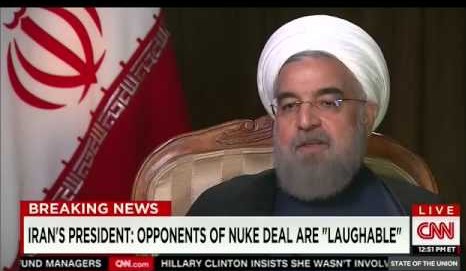PHOTO: Iran’s President Rouhani in an interview broadcast by CNN on Sunday night
LATEST
On the eve of his Monday speech to the UN General Assembly, Iran’s President Hassan Rouhani has said Syria’s Assad regime must be bolstered to fight the Islamic State.
Rouhani told the US network CNN in an interview broadcast on Sunday:
In Syria, when our first objective is to drive out terrorists and combating terrorists to defeat them, we have no solution other than to strengthen the central authority and the central government of that country as a central seat of power.
So I think today everyone has accepted that President Assad must remain so that we can combat the terrorists.
The President’s statement accompanies a high-profile Russian campaign, backed by Moscow’s escalating military intervention in Syria, for the international community to endorse Assad’s continued rule during a political transition.
Rouhani did offer the concession: “As soon as this movement reaches the various levels of success and starts driving out the terrorists on a step-by-step basis, then other plans must be put into action so as to hear the voices of the opposition as well.”
The President did not specify which Syrian “opposition” he meant. Iran has derided many among the opposition and rebels as “Takfiri terrorists”, backed by foreign powers such as Saudi Arabia.
US Secretary of State John Kerry met Iranian Foreign Minister Mohammad Javad Zarif on Saturday (see separate entry), but Rouhani denied any negotiations over the Syrian crisis:
Iran, with the United States, does not have any direct talks vis-a-vis Syria. But Iran simultaneously with the European Union, as well as other countries, does have talks regarding Syria.
And those parties to the talks with Iran about Syria are in direct conversations with the United States as well. So perhaps not direct, but there are talks.
Meanwhile, Rouhani endorsed Russia’s intervention and pointed toward the weekend news that the Russian-Iranian effort has succeeded in establishing a coordinating center in Baghdad with both the Assad regime and the Iraqi military.
Russia has decided to undertake a much more serious level of operations in combat against the terrorists in Syria.”
“And during the last meeting [Russian President Vladimir Putin] did announce that some countries such as Iran, Iraq, or Russia must form a semi, a quasi, coalition in order to assist in this fight against Daesh or ISIS and other groups resembling it.
And he told me that he had even spoken with Mr. Obama about this topic, and he would like to renew his commitment to the fight and the defeat of Daesh or ISIS.
And he told me, President Putin said, that Mr. Obama welcomed that analysis and that plan.
Rouhani also spoke about US politics and Iran’s July 14 nuclear deal with the 5+1 Powers. Smiling, he said statements in the recent debate among Republican challengers for the President were “quite laughable”: “Some of them wouldn’t even know where Tehran was, in relation to Iran. Some of them didn’t know where Iran was.”
Rouhani Uses UN Speech for More Criticism of Saudi Arabia
President Hassan Rouhani has used his address to the UN General Assembly on Monday to pile on more criticism of Saudi Arabia over last Thursday’s Mecca stampede that killed at least 765 pilgrims.
In the opening paragraph of his statement, Rouhani declared:
Public opinion demands that Saudi authorities discharge, without delay, their international responsibility in providing immediate consular access for the quick identification and returning of the bodies.
It is also required that the necessary conditions be provided for [conducting] an independent and precise inquiry into the causes of the disaster and [working out] methods for preventing a repeat of that in the future.
Tehran’s officials raised the Iranian death toll from the stampede to 226, with 23 injured and 248 still missing.
Rouhani’s decision to use his high-profile appearance for another denunciation of the Saudis illustrates the intensity of the Iranian campaign against the Saudi monarchy, putting aside the Iranian Government’s consideration of “engagement” of Riyadh to deal with regional crises.
See Iran Daily, Sept 27: Supreme Leader “Saudis Must Apologize for Mecca Disaster”
The Mecca passage overshadowed Rouhani’s praise of the July 14 nuclear deal with the 5+1 Powers, which he said could and “should herald a new era and lead to positive outcomes regarding the establishment of sustainable peace and stability in the region”.
The President said the agreement, which is still to be formally approved by the Iranian regime, could “serve as a basis for foundational change in the region”.
Rouhani spoke only briefly about the Syrian crisis, putting it within the context of an Iranian fight against “terrorism” and for political resolution: “As we aided the establishment of democracy in Iraq and Afghanistan, we are prepared to help bring about democracy in Syria and also Yemen.”
Meanwhile in Tehran, the Deputy Chief of Staff of Iran’s military said the tragedy might have an intentional plot between Israel and the Saudi monarchy.
General Masoud Jazayeri said, “Given the usurper Zionist regime’s infiltration and influence on the al-Saud, there is a growing possibility that the crane crash incident at the Grand Mosque [killing 111 people on September 11] and the death of thousands of people in Mina were the result of deliberate crime.”

